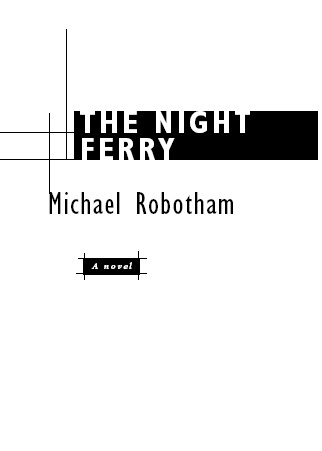The Night Ferry
Authors: Michael Robotham
Tags: #Fiction, #General, #Mystery & Detective, #Suspense, #Thrillers, #Police Procedural, #London (England), #Human Trafficking, #Amsterdam (Netherlands)

| The Night Ferry - SA | |
| Stand Alone [0] | |
| Michael Robotham | |
| Vintage (2007) | |
| Rating: | ★★★★☆ |
| Tags: | Fiction, General, Mystery & Detective, Suspense, Thrillers, Police Procedural, London (England), Human Trafficking, Amsterdam (Netherlands) |
At the start of the sharply plotted third thriller from Australian author Robotham (after
Suspect
and
Lost
), London police detective Alisha Barba, a Sikh woman who's recovering from a back injury incurred in the line of duty in
Lost
("After six operations and nine months of physiotherapy I am fit again, with more steel in my spine than England's back four"), receives a brief note from a school friend, Cate, whom she hasn't heard from in eight years: "I'm in trouble. I must see you. Please come to the reunion." At the school reunion, the pregnant Cate tells Ali that someone is after her baby. As Cate and her husband, Felix, are leaving the event, a car strikes them both, killing Felix instantly and fatally injuring Cate. Insp. Det. Vincent Ruiz, Ali's crotchety colleague, accompanies her to Amsterdam in search of answers that involve drugs and frozen human embryos. In keeping with the opening sentence's invocation of Graham Greene, the author's terse, resonant prose hides more than it reveals. Readers will hope Robotham has many more books of this caliber in him.
(June)
Copyright © Reed Business Information, a division of Reed Elsevier Inc. All rights reserved.
Robotham gave the lead role in last year's
Lost
to London homicide inspector Vincent Ruiz, a supporting character from the accomplished
Suspect
(2005). Here he shines the spotlight on Ali Barba, who served as Ruiz's able sidekick until her back was broken by a baddie. Thematic elements also link entries in this sort-of series: each follows a British professional (psychologist or cop) confronting the fallout of crimes against children. This time, Barba's drawn into an international baby-selling conspiracy that may include the forced impregnations of immigrants. Although her strong will and young runner's physique help effect full rehabilitation, the sensible Sikh detective puts off returning to the Metropolitan Police when an estranged friend is killed and discovered to have been faking her pregnancy. With an assist from the retired-but-still-salty Ruiz, Barba begins untangling a mystery as twisted and slippery as an umbilical cord. Robotham sometimes risks subverting the story to a social message, but the plot takes several unexpected turns, and Barba proves a refreshingly different kind of protagonist for a British crime novel.
Frank Sennett
Copyright © American Library Association. All rights reserved



CONTENTS
TITLE PAGE
ACKNOWLEDGMENTS
BOOK ONE
CHAPTER 1
CHAPTER 2
CHAPTER 3
CHAPTER 4
CHAPTER 5
CHAPTER 6
CHAPTER 7
CHAPTER 8
CHAPTER 9
CHAPTER 10
CHAPTER 11
CHAPTER 12
CHAPTER 13
CHAPTER 14
BOOK TWO
CHAPTER 1
CHAPTER 2
CHAPTER 3
CHAPTER 4
CHAPTER 5
CHAPTER 6
CHAPTER 7
CHAPTER 8
CHAPTER 9
CHAPTER 10
CHAPTER 11
CHAPTER 12
CHAPTER 13
CHAPTER 14
CHAPTER 15
CHAPTER 1
CHAPTER 2
CHAPTER 3
CHAPTER 4
CHAPTER 5
CHAPTER 6
CHAPTER 7
CHAPTER 8
CHAPTER 9
CHAPTER 10
CHAPTER 11
CHAPTER 12
CHAPTER 13
ALSO BY MICHAEL ROBOTHAM
COPYRIGHT
This one is for Alpheus “Two Dogs” Wil iams,
a mentor and a mate
acknowledgments
This is a story that could not have been told without Esther Brandt and Jacqueline de Jong, who were invaluable in helping my research. Through them I met Sytze van der Zee, Leo Rietveld and the remarkable Joep de Groot, my guide through Amsterdam’s famous red light district.
Elsewhere I am indebted to Ursula Mackenzie and Mark Lucas for their friendship, advice and belief that I have something inside me that is worth writing. For their hospitality I am grateful to Richard, Emma, Mark and Sara. And I’d be lost without my three daughters, Alex, Charlotte and Bel a, who make me laugh and forget work.
Yet again, however, it is Vivien who deserves most of the credit. My researcher, plotter, reader, reviewer, lover and wife, she is
my
love story.
When the first baby laughed for the first time, the laugh broke into a thousand pieces and they al went skipping about, and that was the beginning of fairies.
—SIR JAMES BARRIE,
Peter Pan
1
It was Graham Greene who said a story has no beginning or end. The author simply chooses a moment, an arbitrary point, and looks either forward or back. That moment is now—an October morning—when the clang of a metal ic letter flap heralds the first post.
There is an envelope on the mat inside my front door. Inside is a smal stiff rectangle of paper that says nothing and everything.
Dear Ali,
I’m in trouble. I must see you. Please come to the reunion.
Love, Cate
Sixteen words. Long enough to be a suicide note. Short enough to end an affair. I don’t know why Cate has written to me now. She hates me. She told me so the last time we spoke, eight years ago. The past. Given long enough I could tel you the month, the day and the hour but these details are unimportant.
Al you need to know is the year—1998. It should have been the summer we finished university; the summer we went backpacking across Europe; the summer I lost my virginity to Brian Rusconi and not to Cate’s father. Instead it was the summer she went away and the summer I left home—a summer not big enough for everything that happened.
Now she wants to see me again. Sometimes you know when a story begins…
2
When the day comes that I am asked to recalibrate the calendar, I am going to lop a week off January and February and add them to October, which deserves to be forty days long, maybe more.
I love this time of year. The tourists have long gone and the kids are back at school. The TV schedules aren’t ful of reruns and I can sleep under a duvet again. Mostly I love the sparkle in the air, without the pol en from the plane trees so I can open my lungs and run freely.
I run every morning—three circuits of Victoria Park in Bethnal Green, each one of them more than a mile. Right now I’m just passing Durward Street in Whitechapel. Jack the Ripper territory. I once took a Ripper walking tour, a pub crawl with ghost stories. The victim I remember best was his last one, Mary Kel y, who died on the same date as my birthday, November the ninth.
People forget how smal an area Jack roamed. Spitalfields, Shore-ditch and Whitechapel cover less than a square mile, yet in 1888 more than a mil ion people were crammed into slums, without decent water and sewerage. It is stil overcrowded and poor but that’s only compared to places like Hampstead or Chiswick or Hol and Park. Poverty is a relative state in a rich country where the wealthiest are the first to cry poor.
It is seven years since I last ran competitively, on a September night in Birmingham, under lights. I wanted to get to the Sydney Olympics but only two of us were going to make it. Four-hundredths of a second separated first from fifth; half a meter, a heartbeat, a broken heart.
I don’t run to win anymore. I run because I can and because I’m fast. Fast enough to blur at the edges. That’s why I’m here now, flirting with the ground while perspiration leaks between my breasts, plastering my T-shirt to my stomach.
When I run my thoughts become clearer, or at least concentrated. Mostly I think about work and imagine that today someone wil cal and offer me my old job back.
A year ago I helped solve a kidnapping and find a missing girl. One of the kidnappers dropped me onto a wal , crushing my spine. After six operations and nine months of physiotherapy I am fit again, with more steel in my spine than England’s back four. Unfortunately, nobody seems to know what to do with me at the Metropolitan Police. I am a wonky wheel on the machine.
As I pass the playground, I notice a man sitting on a bench reading a newspaper. There is no child on the climbing frame behind him and other benches are in sunshine. Why has he chosen the shade?
In his mid-thirties, dressed in a shirt and tie, he doesn’t raise his eyes as I pass. He’s studying a crossword. What sort of man does a crossword in a park at this hour of the morning?
A man who can’t sleep. A man who waits.
Up until a year ago I used to watch people for a living. I guarded diplomats and visiting heads of state, ferrying their wives on shopping trips to Harrods and dropping their children at school. It is probably the most boring job in the Metropolitan Police but I was good at it. During five years with the Diplomatic Protection Group I didn’t fire a shot in anger or miss one of the wives’ hair appointments. I was like one of those soldiers who sit in the missile silos, praying the phone never rings.
On my second circuit of the park he is stil there. His suede jacket is lying across his lap. He has freckles and smooth brown hair, cut symmetrical y and parted to the left. A leather briefcase is tucked close to his side.
A gust of wind tears the newspaper from his fingers. Three steps and I reach it first. It wraps around my thigh.
For a moment he wants to retreat, as if he’s too close to the edge. His freckles make him look younger. His eyes don’t meet mine. Instead he bunches his shoulders shyly and says thank you. The front page is stil wrapped around my thigh. For a moment I’m tempted to have some fun. I could make a joke about feeling like tomorrow’s fish-and-chips.
The breeze feels cool on my neck. “Sorry, I’m rather sweaty.”